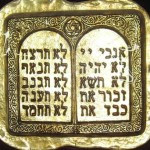

Q. How can some people be unethical in business even though they keep kosher homes?
A. I honestly don’t know.
What you eat and how you live your life are part of one and the same Torah.
There are no marks for picking and choosing the commandments you keep, though of course it is better to keep something rather than nothing.
But since keeping kosher is such a visible observance, it is not only God who must be puzzled to see kosher-keeping Jews being fussy about food and less concerned about honesty, but other people who say this is not a good advertisement for religion.
I have to add, though, that it works the other way too. It is to be deplored if kosher people are not ethical, but also if ethical people are not kosher.
The Torah way of life is comprehensive; omitting ethics leaves Judaism lopsided, but so does omitting kashrut.
READING THE 10 COMMANDMENTS EVERY DAY

Q. Why don’t we say the Ten Commandments every day?
A. Once upon a time we did (Mishnah Tamid 5:1), but the practice was changed (B’rachot 12a) “because of the claims of the sectarians”.
This is a reference to the early Christians who said (Galatians 3:7) that only the Decalogue came directly from God but the other commandments were conveyed through angels as punishment for the Golden Calf.
Judaism did not want to give the impression of supporting these claims.
The Palestinian synagogue in old Cairo was reading the Ten Commandments in the liturgy as late as the 13th century.
When the dispute was no longer so acute, attempts were made to reintroduce the Ten Commandments. One compromise that was arrived at was to read hints of the Decalogue into Biblical passages such as Lev. 19.
Several siddurim add the Ten Commandments to a series of optional readings at the end of the morning service.
HUMAN DIGNITY
Mishpatim doesn’t come where it does in the Book of Exodus just by chance. It follows the Ten Commandments which lay down the basic rules of human dignity.
Not long before this, there is a series of chapters about the era of Egyptian bondage, describing the experiences of the Children of Israel when Egypt tried to deny them their human rights as Children of the Creator.
The enslavement showed the spirit of the Israelite people, who had decided spontaneously that no taskmaster was going to turn them into unthinking clones of a callous regime.
Having lived through that period, Israel was ready for its protest against human debasement to be turned into a universal code, much of which can be regarded as an unapologetic Jewish response to the teaching of Aristotle that in the nature of things the world was divided into those who were meant to be masters and those who were meant to be slaves.
The Torah says that even those who thought they were masters were answerable to a higher Master, and even those who thought they were slaves were only bondmen, who, deprived economically, sold themselves for a set period and were thereafter entitled to their freedom.
The Talmud championed the rights of the bondmen, saying that they had to be treated like their masters – “If you eat white bread they must not be given black, if you drink wine they must not be given water, and if you sleep on a feather bed they must not lie down on straw”. When a bondman’s time of release arrived he had to be loaded with farewell gifts.
In 19th century America Rabbi Morris Raphall aroused great controversy when he argued that the Bible endorsed slavery, whilst actually the Biblical type of slavery was not the abject chattel-like existence of the American coloured slaves.
In a sense “slavery” was entirely the wrong word to use to describe the Biblical bondman.
